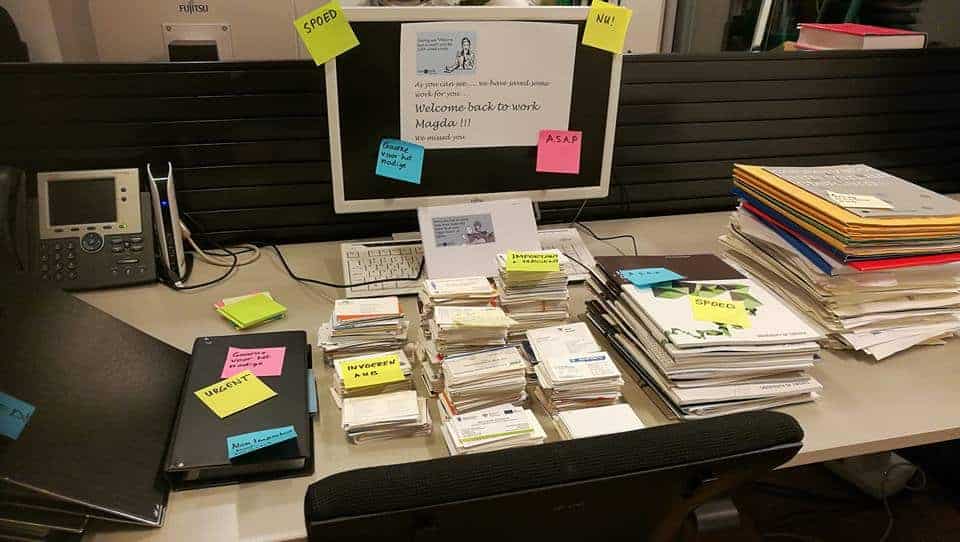What to Do When an Employee Family Member Dies
Sam walked up, teary-eyed and with a look of distress across his face up. My mind flashed to every possibility. I knew it wasn't good… but I had no idea what it could be.
As we sat down with ane another, lonely in the conference room, he looked downward, took a deep breath, and in a shaking voice said, "I just found out my brother died."
Would you know what to say if that happened to i of your team members?
It's the last thing in the world you desire to happen to anyone, only the reality is that sometimes tragedy falls on those closest to united states of america. And when information technology'southward one of your ain employees, information technology's of import to know how to answer and support them.
A manager recently emailed u.s.a. request for advice on how to handle a similar situation, so it inspired u.s.a. to go inquire some long-time leaders for advice.
Below are responses from leaders on supporting squad members going through bereavement at work, and how they navigated those challenges. We too heard from a manager who experienced loss starting time-hand and shares their advice for supporting those who are grieving.

Bereavement at work: What to exercise if your team member loses a loved one
Your showtime response is i of the virtually of import moments after finding out about a team member's loss.
You might non know exactly what to say, but if you know how to respond well, it will speak volumes and mean a lot to the impacted team member.
How to Reply When You Starting time Observe Out
Author and speaker Mark Crowley says the best thing you tin do later learning that a team fellow member has lost a loved one is to telephone call and offer your back up.
"It's tempting to believe employees don't want to be "bothered" by their dominate in their time of grief and mourning...But in moments of deep loss, human beings need to experience supported and cared for by the people closest to them."
If you're a leader that cares, or as Mark likes to say, Leads from the Center, your words volition thing quite a scrap to your team member. You may even be the beginning person in the company they tell.
Mark's advice continues:
"Telling someone directly that you lot are profoundly sad for their loss, and that y'all empathize with all the pain they are feeling goes right to their hearts."
This kind of thoughtfulness makes a big impact and shows your team member know that you're there for them.
Tell them about your company'due south bereavement policy
Afterward that initial telephone call or meeting, if you lot haven't already, cheque what your company's bereavement policy is and whatsoever local laws. This takes the burden off of them figuring it out, so they know how many days they're allowed to take off, as well as other important details.
According to the US Section of Labor, there is no national police force requiring any paid go out, simply there is unpaid time off permitted under the Family Medical Exit Act and to nourish funerals. This ways their options volition actually vary state to state and company to company.
Once y'all know what your visitor's policy officially is, allow your team member know you found the data while you lot were looking into ways you could assist. Best of all, this can potentially get HR or another leader involved to help and show support as well. Especially at smaller companies, y'all can look others will want to help and express condolences, also.
Regardless of how much time they take, realize y'all will need to give them fourth dimension to get back on their feet. While no amount of fourth dimension can completely heal the pain caused past a tragic loss, time off and lightening their burden of work can brand a big divergence.

What to do while they've gone on bereavement
While your grieving team member is away, it's of import to have a game plan, especially if it could be an extended exit.
The smaller your team, the less you can afford to exist without a unmarried team member, so information technology's of import to know how to balance being empathetic with making sure the work gets done.
Crowley says he'southward often seen selfish managers respond to an employee'southward loss from the perspective of what they're losing– seeing their goals and deadlines sideslip through their fingers due to the loss of a team fellow member. These managers volition say tone-deaf things similar:
I know you've suffered a great loss, simply practise you have any sense on when you might be back at work?
Crowley understands how this can happen, just does not alibi it:
"Yous might gasp at this, just workplace pressures seem so smashing at times that many of us lose sight of what beliefs is nearly advisable, and we end up thinking more about ourselves than our employee."
The reality is, all of the states will be impacted past the loss of a loved one at different points in our lives. Information technology's important to be as empathetic as possible while thinking about the best way to move forward.
So what do yous do? Hither's what Crowley recommends:
"When a fellow member of your team suffers a great loss, the leader's task is to circumvolve the wagons, bring the team together and divvy up the employee'southward workload until they return.
Fifty-fifty in times of neat loss, most people tend to feel guilty about beingness abroad. So what they need in the moment is to hear their boss say, 'Please don't worry about work. We've got you covered.'"
Crowley says that managers often neglect to recognize how critical a moment it is for their reputation as a leader:
"It's in these critical moments when people decide if you're a boss worth striving for– or even working for." Brand sure your response says, "We're here for you."

Plan for while they're gone, and their return
Being empathetic is important, but it'south equally important to not overlook the importance of having a game plan for how you lot're going to embrace the team member'due south workload while they're gone.
Crowley shared with us a story of a previous manager of his whose v-year-quondam died suddenly. When she took a ii-month leave, her team stepped upwardly and took on the job of managing themselves.
However, over time, he could come across that the pressure was taking a price.
Without a proper managing director to lead the team, the absence caused a cake that affected the team.
Making matters worse, when she returned, there were new problems and challenges.
"It rapidly became clear she was non sufficiently healed. She would come to work, merely close her door. Or she would leave after only a few hours,"
Ultimately, after much patience, things didn't work out.
Crowley says that if it happened over again, he'd still offering the person the aforementioned compassion and support as before. However, he'd have had a improve plan for her and the team:
"I will always regret not realizing that I had a business to run...and that when she went out on extended bereavement get out, I could accept institute a new manager to atomic number 82 her team."
By finding a replacement to fill the space the grieving manager left, information technology would take been a win-win: the manager would exist given the time they need while the pressure level on your terminate for them to come back is removed.
And then, when they do render, he could take found a part that better fit what she was ready for, without the pressure of her full squad correct off the bat.
Speaker & consultant, Mark C. Crowley is the writer of Atomic number 82 From The Centre, Transformational Leadership For The 21st Century . Connect with him via his website at www.markccrowley.com.

What to practise when they get back
Now that your team member is back in the role, information technology's important not to make assumptions, whether that's bold everything is back to normal or that they desire to take it ho-hum.
Anybody deals with grief differently, and oftentimes the most difficult part about coming back to work isn't the work itself, but the response from their dominate and co-workers.
You need to experience out how they're doing and run into how they want to movement forward. If you're not sure if they're upward for moving forward with their 1-on-1s correct now, ask them.
Did they say yep? They probably want to get back to work. Work allows us to keep busy and connect with others, both of which can help someone experiencing grief. Detect out what they need to feel like they can take hold of upward and feel productive. Prioritize, remove blockers, and lend a hand where y'all can.
Did they say no, hesitate, or interruption? Let them set the pace and give them fourth dimension to get back into the office flow. If you lot're already coming together with them and you go the feeling they're not comfortable opening upwardly, throw out the calendar and let them talk virtually whatever they feel like.
This is where having an emotional savings business relationship built upwards from consistent 1-on-1s can really help. If they already trust you lot, they will know you take their best interests at center, and will be more than willing to open up almost how they're feeling.
How to handle bereavement with a new squad member
What if the employee who experienced the loss is new to the team?
Without any previous connexion established, it can make the state of affairs fifty-fifty more than difficult to handle.
What can you lot practice?
Leadership coach and Executive Velocity founder Beth Miller coached an executive in exactly this position.
The executive did everything she could recollect of: nourish the funeral, expressed her condolences, and even offered a donation in honor of the employee's loved ane. Those were immediate and thoughtful things she could do.
Unfortunately, it was later on this that the difficult part began. Every bit Miller recalls:
"When the employee returned to work, she expressed her sorrow for his loss. She then followed with the question: "is there anyone that you lot tin can talk to virtually your loss?"
This question demonstrated her business organisation but didn't commit her to be a grief counselor, and the answer provided her with the name of the person he felt close to in the system. She besides reminded him of the visitor's EAP, employee assistance plan.
Past taking the consequence head on from the outset, the executive fabricated sure that the employee got the assistance and back up they needed. Then, over time, she kept an eye on how they were doing on their journeying of moving forward.
"She so became keenly enlightened of the employee's behaviors, looking for early warning signs that could impact his productivity such as sick days or detachment.
In this case, the employee's free energy and interaction with other squad members did non seem to change.
She likewise checked in with the employee'south close friend, to larn if she was missing anything about the employee'southward recovery from loss.
During the side by side few months she sporadically checked in with both him and his shut colleague to see how he was doing and if he needed any additional assist. She believed that having some other employee to check in on the grieving employee was critical to success.
And this effort she took to support her grieving employee made a real difference. According to Miller, two years afterwards, te employee is even so with the company and has taken on more than responsibilities.
Speaker and leadership authority Beth Miller is the Leadership Executive Counselor and founder of Executive Velocity and Chair with Vistage . Learn more about her work at executive-velocity.com/ .

What to Do If the Tragedy Happens to You
What if it isn't a member of your squad who experiences the loss – merely you?
The pain of a tragic loss is unimaginable for those who haven't experienced it, so how can you deal with the grief while moving forward and leading your team?
While we don't presume to know the respond for anybody, when I tweeted looking for advice on those that accept dealt with this effect before, I received a DM from someone who this is very raw and real for.
Hither are some of their insights and advice they had, every bit well as from Facebook'due south Sheryl Sandberg, who also suffered tragedy.
Open up a dialogue with your squad
Travis Dailey, a reader of the Lighthouse blog, entrepreneur, and founder himself, was willing to open upwards about the recent and tragic loss of his daughter to offering his insights on what has helped him.
Nosotros asked him what has helped during this difficult time equally well every bit what advice he would give for coworkers who desire to testify their back up just are unsure of what to do.
"For me, addressing my daughter'south death in my commencement meeting with a team member was the nearly helpful.
In most of the meetings, I'd thank them for allowing me the fourth dimension to grieve and they'd offering their condolences over again."
Facebook COO Sheryl Sandberg talked almost this very same thing before when she opened up almost her experience dealing with grief after the unexpected loss of her husband.

Kick the elephant out of the room
When coming back to Facebook after her bereavement leave, Sandberg discovered that her co-workers were unsure of how to approach her. They wanted to help but weren't sure how or what to say.
She wrote in a detailed, public Facebook post nigh her experience:
"I realized that to restore that closeness with my colleagues that has always been and so important to me, I needed to allow them in... and that meant being more than open and vulnerable than I always wanted to be."
She decided to open up to those she worked closely with and told them they could ask her whatever they wanted and she would reply.
Many of her colleagues opened up most what had been on their mind, and how they had wanted to help merely weren't sure what to do. As a result, the fear was replaced by an open dialogue and a sense of psychological safety.
"Ane of my favorite cartoons of all time has an elephant in a room answering the phone, proverb, 'It's the elephant.'
...Once I addressed the elephant, we were able to kick him out of the room."
Kick out the elephant in the room is a key habit for leaders to embrace. Every bit former Pixar co-founder Ed Catmull wrote on the value of creating an open dialogue and facing these tough questions caput-on:
"Candor isn't brutal. It does not destroy. On the contrary, any successful feedback organisation is congenital on empathy, on the idea that we are all in this together, that we understand your hurting because we've experienced it ourselves."
It takes backbone to exist willing to open upwards. In doing so, yous transport an important message to your team that you face your challenges boldly, together, and by valuing each other's input.

Thoughts truly count for bereavement at piece of work
In improver to opening upward to his team, we asked Dailey what his team has done that was most appreciated.
"My company sent flowers to my firm. The individualized cards that I received from team members were the well-nigh meaningful. In a world of tech, it'south overnice to receive a physical annotation from someone."
Things like a personalized, physical note are a thoughtful way to thank a team member or simply show you care. It also points to something even greater: the ability of connection.
As Sandberg shared in her open up post:
"While the feel of grief is profoundly personal, the bravery of those who have shared their own experiences has helped pull me through.
...I have also learned to enquire for help—and I have learned how much help I demand."
Solitude is an important function of the bereavement process, only it's important not to forget that your team is there and wants to help. Past non just opening a dialogue, but also being willing to have support, you lot can tap into a powerful source of assistance and strengthen from your team in the process.

What Do You Say to an Employee who has Suffered a Loss?
One of the most hard things near this type of state of affairs, before fifty-fifty your response equally their manager, is only how to be an compassionate human being to someone who has experienced loss.
What exercise you say to someone who has just had one of the virtually important people in their life taken from them?
For those who haven't experienced a similar loss, our first response– while pregnant well– can exist more harmful than anything without u.s.a. even knowing it.
"I have learned that I never really knew what to say to others in need," Sandberg says. "I tried to clinch people that it would be okay, thinking that hope was the almost comforting thing I could offer."
Dailey echoed this, expressing that to someone experiencing grief, words of hope show a lack of empathy for what the person is going through:
"You carry that weight for the residuum of your life. You do not shed information technology past getting over it. It changes you and becomes a part of you."
The last matter you desire is to say the wrong matter, so be careful falling on cliches or saying something that doesn't help them.
What to avoid saying
A friend of Sandberg's with late-stage cancer once told her that the worst thing someone could say to him was, "It'due south going to be okay."
However, it wasn't until her ain experience that she realized what he had meant.
"Real empathy is sometimes not insisting that it volition be okay but acknowledging that it is non."
Those who take experienced loss know that information technology's a pain that will never fully go abroad. Unfortunately, it'south something that's difficult for those who haven't experienced something similar to understand, which is a big reason for this post.
Sandberg says even a well-intentioned, "How are you?" tin trigger strong feelings:
"When I am asked 'How are you?' I stop myself from shouting, 'My husband died a month ago, how do you recollect I am?'"
Similarly, anything that presumes the loss will go away– or tries to make it so– should be stayed away from, including:
- "You lot're going to exist fine."
- "Time is the great healer."
- "They're in a meliorate identify."
What if you just plant out almost a squad member's loss– or they merely got back in the part– and y'all want to show your support? What do y'all say instead?
What to say instead
Instead of, "How are you," Sandberg says "How are you today" is better:
"When I hear, 'How are you lot today?' I realize the person knows that the best I can do right now is to get through each day."
Alternatively, Dailey says,
"It'due south odd but I've felt the well-nigh comforted when squad members and friends say, 'I'm pitiful. I don't know what to say.'"
Hither are a few more ideas of things you can say to limited your support to a grieving employee:
- "We're here for you lot." (Bear witness empathy without trying to change how they're feeling.)
- "What can nosotros do to help you correct now?" (Like Sheryl's suggestion, you focus on firsthand needs)
- "I'd dear to talk if y'all're up for it. Information technology'southward ok either manner." (Extend the offer without making them experience like they take to respond or commit to anything.)

Back up Your Team When They Demand it Most
Having a squad member go through bereavement at work is a situation no manager wants to feel.
Unfortunately, it's a part of life – and knowing how to handle it can brand the recovery process easier for both them and the rest of your team.
Keep today'due south advice from leaders who have helped others, and those that sadly experienced information technology first hand, in mind when you face this challenge. And if you've dealt with this, and have advice to share, please exit a comment so everyone can benefit.
Thanks to Mark Crowley and Beth Miller for their insights. And a special thanks to Travis Dailey for being kind enough to open up upwardly most his feel so that others who have experienced loss may do good (then that we tin support them better).
You lot can read more than from Travis at his personal site: travisdailey.com .

Source: https://getlighthouse.com/blog/bereavement-at-work/
Post a Comment for "What to Do When an Employee Family Member Dies"